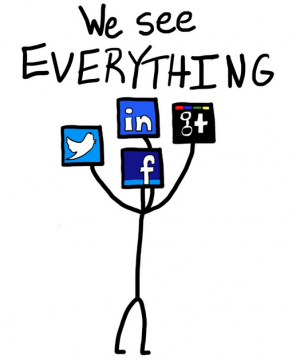Privacy in Social Networking
Contents
Data Storage
Information put into the Internet rarely is deleted. Social networking sites, search engines, and many other websites (which require personal input) keep records of information about users. Statistics are oftentimes gathered online for use in tailoring advertising. On a more sinister level, personal attacks on user information are done in order to gain credit card information or other sensitive information. Information put on social networking istes can be harmful to a person's reputation. Once information is shared online, its almost impossible to delete it forever. This rule was not realized when the internet first began and for those initial users who were not concerned with hiding and protecting personal information online have more times than not felt the negative consequences of their actions.
Dangers
Identity Theft
Identity theft is a form of fraud that involves using another person's identity, typically to gain various financial benefits. Stealing a person's identity is much easier in an online setting where personal information is constantly being used and provided. Many people put in information such as email address, permanent addresses, credit card information etc. without assuring the site is secure. Computer hackers are also able to obtain a user's information if companies do not take the proper precautions to protect the user's data.
Cyberbullying
Cyberbullying is the use of the Internet to harm an individual or group in a repeated and hostile manner. Cyberbullying can include threats, sexual comments, posting false information, disclosing personal information or making a victim subject to ridicule. Cyberbullying is become more popular due to its lack of supervision. Chat rooms, instant messages, cell phone conversations and social networking sites are less supervised and harder to detect. Social networking sites create an ideal setting for bullies to engage in cyberbullying.
Cyberstalking
Cyberstalking is the use of the Internet to stalk or harass an individual, group or organization. This could include making threats, monitoring, identity theft, solicitation, or collecting personal information in order to harass. The Internet creates a barrier for a stalker to hide behind, thus creating the perfect domain to stalk individuals.
Employment
Social Networking sites create a unique opportunity for employers to screen potential candidates for negative information. In 2008, Careerbuilder.com estimated that one in five employers use social networking sites to screen potential candidates [1] Employers may screen candidates or employee profiles to look for evidence of alcohol or drug abuse, poor communication skills, inappropriate photographs, inaccurate qualifications, bad mouthing of former employers, etc.
Monitoring employee profiles is becoming an increasingly frequent activity by employers to determine whether or not employees are unproductively browsing the internet in the workplace. In the UK it has been estimated that an average of 2 million employees spend over an hour a day on social networking sites, costing £14 billion. [2]
Screening of potential candidates and employee profiles may be illegal in certain jurisdictions within the United States, [3] however there is little doubt that this behavior will continue because of difficulties identifying this type of behavior.
Protection
Privacy Settings
As technology advances, and social networking sites transform, privacy settings must be kept up to date. By frequently checking for more privacy updates and new settings, users can ensure only the information they want to be public is. Social networks' managers need to keep the needs of the people in mind when implementing new features and options. Many do not wish to automatically disclose important information and need to be properly notified when significant changes take place. A step-by-step of all the new privacy options and filters should be put in place as a tutorial for users.
Monitoring Profile
The tools afforded to users for increasing complex profile creation enables users to voluntarily share designed aspects of a self. Simply mindfully curating one's online profile is one strategy for maximizing ones' information privacy. Users can also maintain privacy through careful monitoring of privacy settings, making sure one's preferred settings are not out of date and that only people they choose have access their information. It is also been observed that while different platforms encourage different social norms, it is not uncommon for users to fudge qualities relating to their offline self in order to construe a desired online persona. [4]
Ethics of Privacy Settings
As a software company, Facebook's terms of service claims "ownership" for all types of data entered or uploaded onto facebook, including pictures, videos, status updates, and location check-ins. Although Facebook claims ownership of users' uploaded media, Facebook also allowed users to choose what of their media all others can see - despite Facebook having unlimited access to a user's information.
Although who views a person's media or other personal information can be controlled through privacy settings, people who do have access to other people's Facebook pages (e.g. friends), are not bound by any contract to limit spreading their friend's information to advertisers or to promote events and products. This means that updated information can pop up in news feeds without notifying the user, depending on specific privacy and notification settings.
See Also
References
- ↑ http://www.computerworld.com/s/article/9114560/One_in_five_employers_uses_social_networks_in_hiring_process
- ↑ http://www.opportunitypeterborough.co.uk/bondholder/events/the-employment-law-dangers-of-social-networking
- ↑ http://www.techrepublic.com/blog/career/employers-who-check-out-job-candidates-on-myspace-could-be-legally-liable/338
- ↑ Ellison, N., Hancock, J., & Toma, C. (2012). Profile as promise: A framework for conceptualizing veracity in online dating self-presentations. New Media and Society, 14(1). doi:10.1177/1461444811410395.
